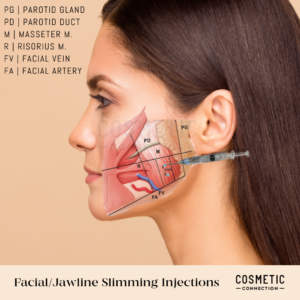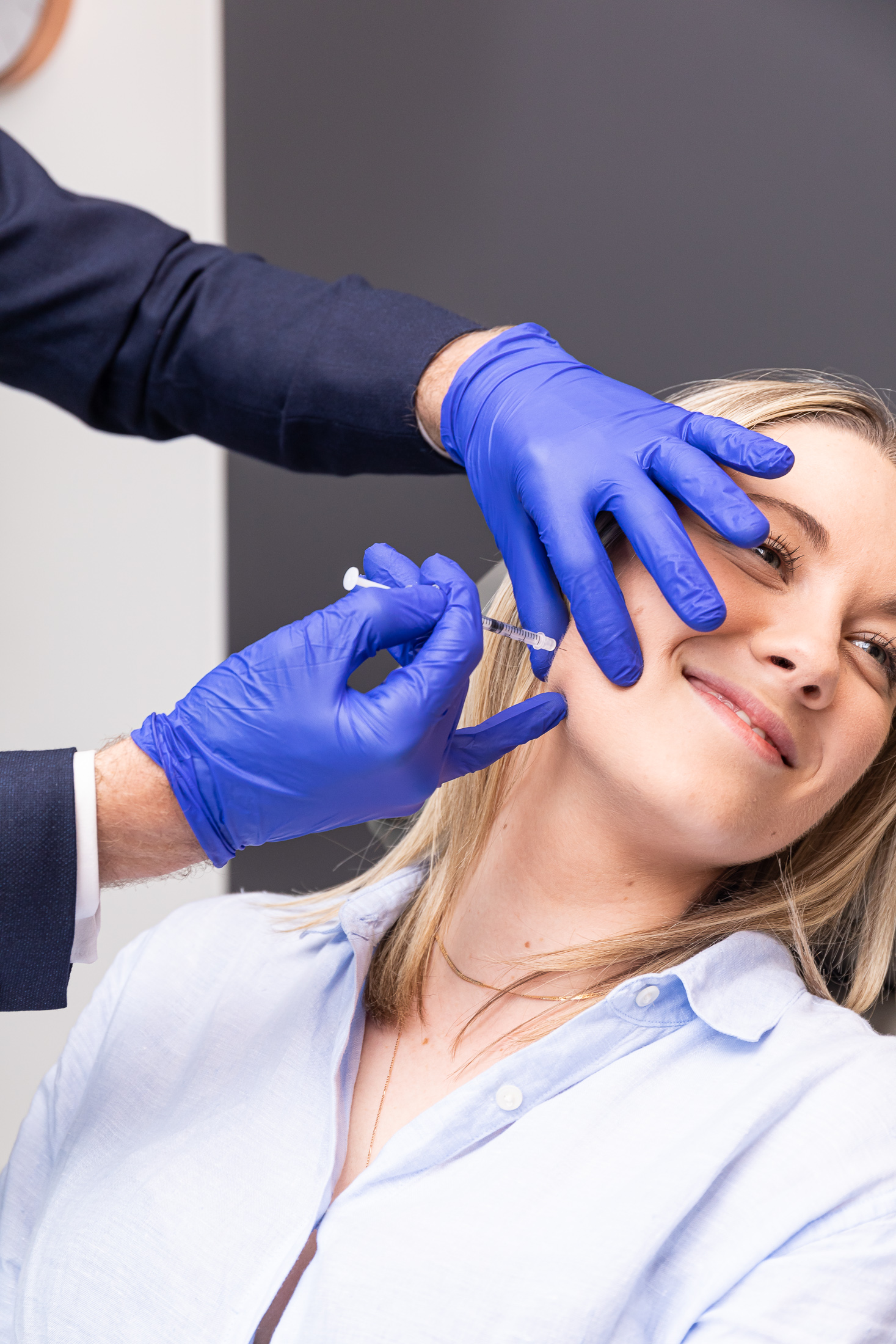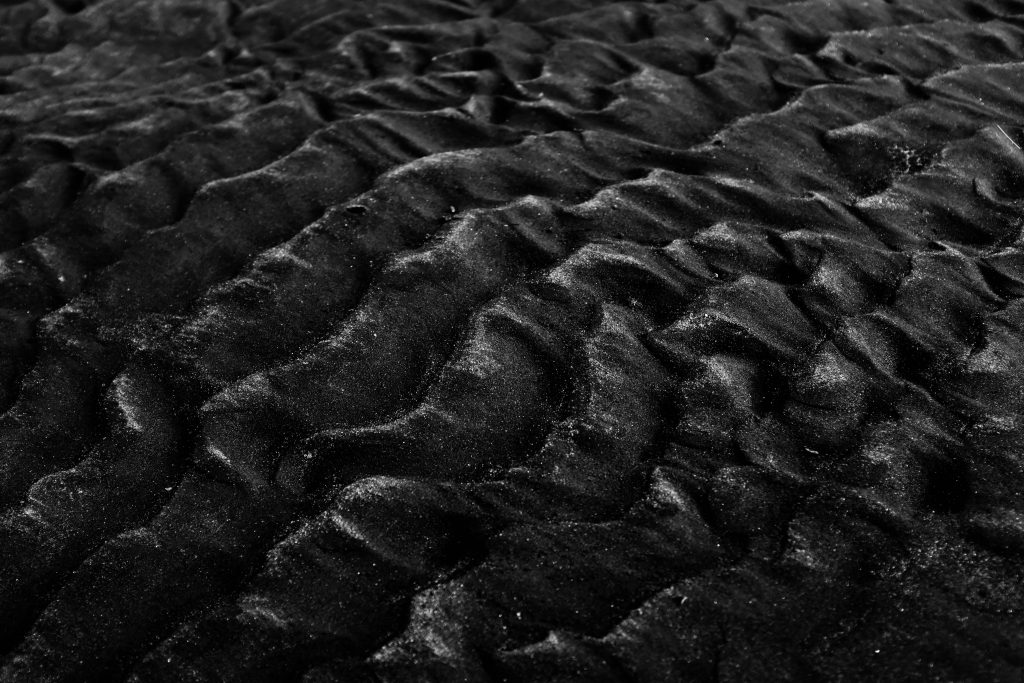Bruxism is the medical term for teeth grinding and clenching. It is a condition in which you grind, gnash, or clench your teeth unconsciously, commonly during sleep. It can cause a variety of problems, including tooth damage, jaw pain, and headaches, so being proactive and getting treatment is very important. It is most often caused by overactivity of the masseter muscles along the jawline, although the temporalis muscles that are located in the temples can also contribute).

Diagram showing the masseter muscle anatomy, and the most common sites for the injection of muscle relaxant.
There are several treatment options for bruxism, including:
- Muscle relaxant injections: Also known as facial slimming injections or masseter injections, this treatment causes a partial relaxation of the masseter muscles responsible for bruxism. Once relaxed, the muscles weaken. This is one of the most powerful and effective treatments available for bruxism, and takes only a few minutes, with almost no discomfort and no downtime. In severe cases, relaxing the temporalis muscles may also be needed.
- Mouth-guards or splints: These are special devices that fit over your teeth and help protect them from grinding and clenching. They can be quite uncomfortable to wear, and may need frequent replacing. While they do protect your teeth, they are often not effective at stopping jaw clenching and headaches.
- Stress management techniques: Bruxism is often related to stress, so finding ways to reduce stress can help alleviate the condition. This may include relaxation techniques, such as deep breathing or meditation, or seeking help from a therapist.
- Medications: In some cases, your doctor may prescribe medication to help relax your jaw muscles and reduce grinding and clenching.
- Dental treatment: If you have damaged teeth as a result of bruxism, your dentist may recommend restorative treatment to repair the damage.
Who can be treated for bruxism?
If you are suffering with the symptoms of bruxism including damaged teeth, dental and jaw joint pain, jaw joint clicking and TMJ dysfunction or constant tension and headaches then you should consider treatment for bruxism.
Temporalis and masseter injections used for treating bruxism are a great first-line treatment option. Injecting masseters for bruxism will also cause a slimming effect to the lower face (hence why they are commonly known as facial slimming injections). If you want to treat bruxism with masseter injections but preserve your jawline and lower face shape, jawline fillers can be used in conjunction.
How often do I need to treat my masseters for bruxism?
The effects of masseter injections typically last between 3 and 6 months. After this time, the muscle may gradually return to its previous size and the treatment may need to be repeated to maintain the desired result. Repeated treatments may last longer, meaning that while you may need to come in more often initially, most people find that they can space their treatments out longer over time, sometimes up to a year.
There are several factors that can affect the longevity of masseter injections for bruxism:
- The treatment dose: A higher dose of muscle relaxant injectable may last longer than a lower dose.
- The individual’s muscle mass: People with larger masseter muscles may require larger doses of injectable to achieve the desired result, and the injections may not last as long in these individuals.
- The individual’s bruxism severity: Individuals with more severe bruxism may require more frequent treatment to maintain the desired result.
- The individual’s response to treatment: Some people may respond better to masseter injections and experience longer-lasting results than others.
Are there any side effects with masseter injections for bruxism treatment?
One of the key advantages about treatment for bruxism with masseter injections is that it is very convenient, taking only a few minutes and with no downtime. Bruising and swelling are rare, and most people experience little to no discomfort.
While the treatment is categorised as a low-risk option, there are some rare side effects, the most important one being an asymmetric smile. This occurs if the muscle is not injected deeply enough, or in people who have a variation in the pattern of their smile muscles. Fortunately, this is a temporary issue and will resolve on its own in a few weeks.
How to find the best clinic for bruxism treatment?
When it comes to any treatment, especially when treating bruxism, it is vital to choose a clinic that has experienced, professional and knowledgeable practitioners. Here at Cosmetic Connection, our team of cosmetic practitioners draw on years of experience in bruxism treatment. Using only premium products, and evidence-based techniques, you can feel reassured that you are in good hands.
If you want to be proactive and book in with our clinic for bruxism treatment, book in for a consultation.


